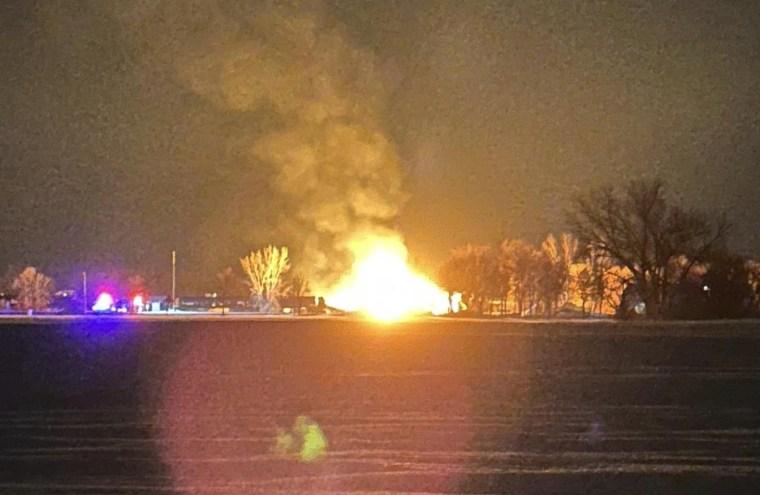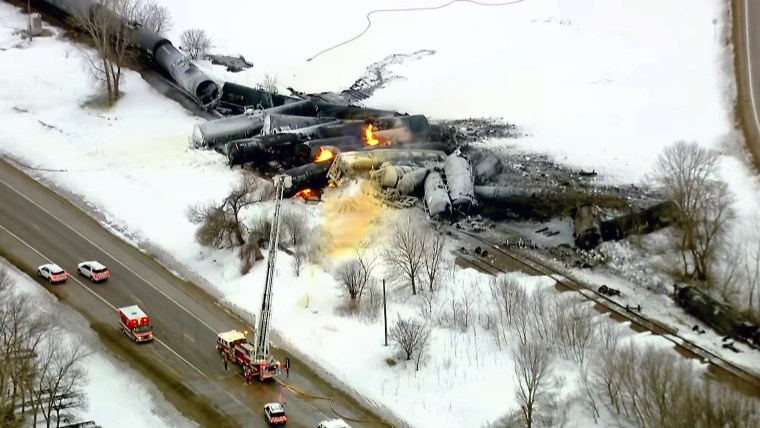A train carrying ethanol derailed and several cars erupted in flames early Thursday in Raymond, Minnesota, triggering an evacuation of people living near the crash site, officials said.
The Kandiyohi County Sheriff's Office was notified around 1 a.m. local time (2 a.m. ET) and an evacuation area within a half-mile around the crash site was established.
Around 22 rail cars “carrying mixed freight including ethanol and corn syrup” derailed, BNSF Railway said in a statement, and several of the derailed tanks caught on fire, the sheriff’s office said.
Ethanol is a highly flammable alcohol. Exposure to ethyl alcohol can cause headaches, nausea, unconsciousness and irritation of the skin and eyes.
Initial reports suggest eight cars were directly involved in the derailment — four containing corn syrup and four containing ethanol — with the ethanol cars bursting into flames, the state Public Safety Department said.
The evacuation order for Raymond, home to about 800 people, was lifted hours later. Residents were allowed to return to their homes around 11:30 p.m. local time, the sheriff’s office said.
“There is no impact to groundwater. Local responders and BNSF personnel continue to work to mitigate the incident," the sheriff's office said in an afternoon update.

No injuries were reported, and the cause of the derailment is under investigation, BNSF Railway said in a statement.
The main track was blocked, the company said. It was still not clear Thursday afternoon when the line will reopened.
The state Transportation Department said Highway 23 was temporarily closed at Raymond from Kandiyohi County Road 1 to Chippewa County Road 1.
Firefighters and EMS personnel had knocked on doors to evacuate residents early Thursday. An emergency collection site and a shelter were set up in the nearby city of Prinsburg. The sheriff's office advised no travel in Raymond on Thursday morning, as well.
Agencies flocked to Raymond, about 100 miles west of Minneapolis. The National Transportation Safety Board said it is launching a team to conduct a safety investigation, and the U.S. Environmental Protection Agency initiated emergency protocols and deployed personnel.

Transportation Secretary Pete Buttigieg tweeted that the Federal Railroad Administration was in Raymond.
“At present no injuries or fatalities have been reported," he said. "We are tracking closely as more details emerge and will be involved in the investigation."
Minnesota Gov. Tim Walz tweeted photos from the scene Thursday afternoon, showing the derailed cars on the track, some still ablaze.
"This morning, I visited the site of the train derailment in Raymond to survey the damage, meet with local officials, and offer the state’s full support," he said. "Our multi-agency emergency response will continue working on the ground to protect the health and safety of Raymond."
A Norfolk Southern freight train carrying hazardous materials derailed Feb. 3 in East Palestine, Ohio.
That derailment led officials to conduct an intentional burn of toxic chemicals in some of the derailed cars to prevent an explosion. The crash prompted an evacuation of about half the town’s roughly 5,000 residents, a multiagency emergency response and lingering worries among residents about long-term health impacts.